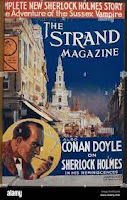In this episode, Decoding Doyle & Deduction–Legacy of Sherlock Holmes . . .
This week, fiction fans, we explore the story of the world's most famous detective – Sherlock Holmes! But to understand Holmes fully, we need to crack the code of his creator, Sir Arthur Conan Doyle.
Side note: Today's episode was inspired by my study of the science of deduction and how Sir Arthur Conan Doyle developed his character.
So, Doyle combined these influences with his own imagination to create the brilliant, eccentric Sherlock Holmes. In 1887, "A Study in Scarlet" introduced the world to this enigmatic detective living at 221B Baker Street with his loyal companion, Dr. John Watson.
How did Holmes first come into the public awareness?
“Elementary, My Dear Watson” – The Strand Magazine!
Founded in 1890 by George Newnes, The Strand was a British monthly magazine aimed at a broad, family audience. It offered mixed content: short stories, factual articles, illustrations, and even humor. The magazine's initial success came from its low price (half the usual rate) and wide appeal.
The Strand became hugely popular in 1891 when it began publishing Sherlock Holmes stories by Arthur Conan Doyle. The magazine continued for over 60 years, featuring works by other notable writers, such as H.G. Wells, P.G. Wodehouse, and Agatha Christie. After ceasing publication in 1950, an American publisher revived The Strand title in the late 1990s, and it continues today with a focus on mysteries and short stories.
While "A Study in Scarlet" sparked interest, the partnership with The Strand Magazine launched Holmes into superstardom. In 1891, the series of short stories featuring the detective's adventures began appearing in the magazine.
This episodic format was genius! Readers craved the next puzzle, the next baffling case. The stories were fast-paced and suspenseful, and Holmes' unique methods of deduction captivated audiences. The popularity of these stories was undeniable. The Strand's circulation skyrocketed, and Conan Doyle became a household name. The collected stories were then published as "The Adventures of Sherlock Holmes" in 1892, solidifying Holmes' place in literary history.
Beyond Baker Street – Doyle and Legacy
Conan Doyle's genius wasn't limited to Sherlock Holmes. He wrote prolifically, venturing into science fiction with Professor Challenger and historical novels. However, Holmes remained his most iconic creation. The character became so popular that Doyle eventually grew tired of him. He famously tried to kill Holmes off in "The Final Problem," but public outcry was immense! Doyle eventually brought him back due to fan demand.
The legacy of Sherlock Holmes and Arthur Conan Doyle is undeniable. These stories have been adapted countless times for film, television, radio, and stage. Holmes's methods of deduction are still referenced today, and his influence can be seen in countless detective characters.
So, next time you see a detective with a magnifying glass or hear the phrase "Elementary, my dear Adamas," remember Sir Arthur Conan Doyle's genius and his timeless creation, Sherlock Holmes!
And if you’re so included, check out The Adventures of Peridot.
Until next time, I’m Patrick Ball; thanks for listening.

Comments
While not a formal scientific discipline, the science of deduction refers to a structured approach to reasoning and reaching conclusions based on evidence and established principles. It's about taking the available information, analyzing it logically, and arriving at the most likely explanation.
Deduction relies heavily on logic. We identify clear premises (observations or facts) and use well-defined rules of inference to draw conclusions that necessarily follow from those premises.
It involves systematically dissecting the available information. This includes identifying relevant details, recognizing patterns, and eliminating possibilities contradicting the evidence.
Deduction is a critical thinking tool. It encourages us to question assumptions, evaluate the strength of evidence, and consider alternative explanations before reaching a conclusion.
Here's an example:
It's raining heavily outside, and you hear a loud crash followed by a power outage.
Deduction: The loud crash could be thunder (supports the raining observation). The power outage often follows thunder during storms (established principle). Therefore, the most likely explanation for the power outage is a fallen tree on a power line from the thunderstorm.
However, it's important to remember that deduction can only work within the boundaries of existing knowledge and evidence. If crucial information is missing, the conclusions might be flawed.
Sometimes, multiple explanations fit the evidence. In such cases, we need to gather more information or consider the likelihood of each scenario.
Overall, deduction is a powerful tool for reasoning and problem-solving. It helps us navigate complex situations, make informed decisions, and uncover hidden truths using logic and critical analysis of evidence.